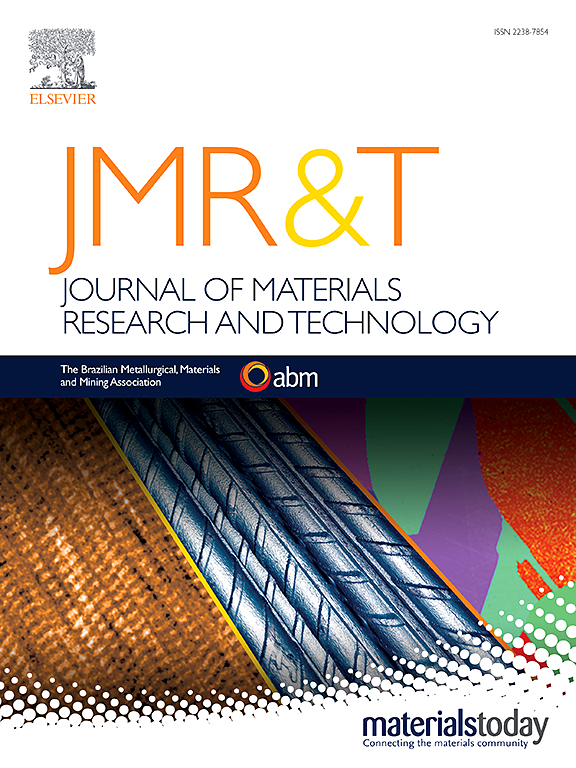Experimental study on the ballistic performance of CFRP/AFB sandwich plate
IF 6.2
2区 材料科学
Q1 MATERIALS SCIENCE, MULTIDISCIPLINARY
Journal of Materials Research and Technology-Jmr&t
Pub Date : 2024-09-21
DOI:10.1016/j.jmrt.2024.09.163
引用次数: 0
Abstract
Lightweight bulletproof plate is highly demanded in the field of security field. A novel plate of carbon fiber reinforced plate (CFRP)/aramid filament bundles (AFB) sandwich plate is manufactured through winding methods in this paper. The ballistic performance is evaluated and failure mechanism is explored on the designed six CFRP/AFB sandwich plates. It is found that the sandwich structure of 3-4 × 16 is the best structure by comprehensively considering the energy absorption, Coefficient of Variation(CV) and shaping difficulty, of which the and the average energy absorption are 225.26 m/s and 150.60 J, respectively. In addition, for the case that the number of filaments in the first entanglement is more and the number of first entanglement in the secondary entanglement is less, the ballistic performance would be better. To the failure mechanism, the upper CFRP is damaged by shear failure and the bottom CFRP shows delamination and separation in the impact process. The filament bundle plate in the core layer is benefit in resistance to projectile impact and it fails mainly by the disintegration and bending. This novel CFRP/AFB sandwich plate is a new direction for producing ballistic proof plate.
CFRP/AFB 夹层板弹道性能实验研究
轻质防弹板在安全领域的需求量很大。本文通过缠绕方法制造了一种新型碳纤维增强板(CFRP)/芳纶丝束(AFB)夹层板。对所设计的六块 CFRP/AFB 夹层板的弹道性能进行了评估,并探讨了其失效机理。综合考虑能量吸收、变异系数(CV)和成型难度,发现 3-4 × 16 的夹层结构为最佳结构,其中 v50 和平均能量吸收分别为 225.26 m/s 和 150.60 J。此外,在第一缠结丝数较多、第二缠结丝数较少的情况下,弹道性能会更好。从破坏机理来看,上层 CFRP 因剪切破坏而损坏,下层 CFRP 在撞击过程中出现分层和分离。芯层中的丝束板在抗弹丸冲击方面具有优势,主要以解体和弯曲的方式失效。这种新型 CFRP/AFB 夹层板是生产防弹板的一个新方向。
本文章由计算机程序翻译,如有差异,请以英文原文为准。
求助全文
约1分钟内获得全文
求助全文
来源期刊

Journal of Materials Research and Technology-Jmr&t
Materials Science-Metals and Alloys
CiteScore
8.80
自引率
9.40%
发文量
1877
审稿时长
35 days
期刊介绍:
The Journal of Materials Research and Technology is a publication of ABM - Brazilian Metallurgical, Materials and Mining Association - and publishes four issues per year also with a free version online (www.jmrt.com.br). The journal provides an international medium for the publication of theoretical and experimental studies related to Metallurgy, Materials and Minerals research and technology. Appropriate submissions to the Journal of Materials Research and Technology should include scientific and/or engineering factors which affect processes and products in the Metallurgy, Materials and Mining areas.
 求助内容:
求助内容: 应助结果提醒方式:
应助结果提醒方式:


